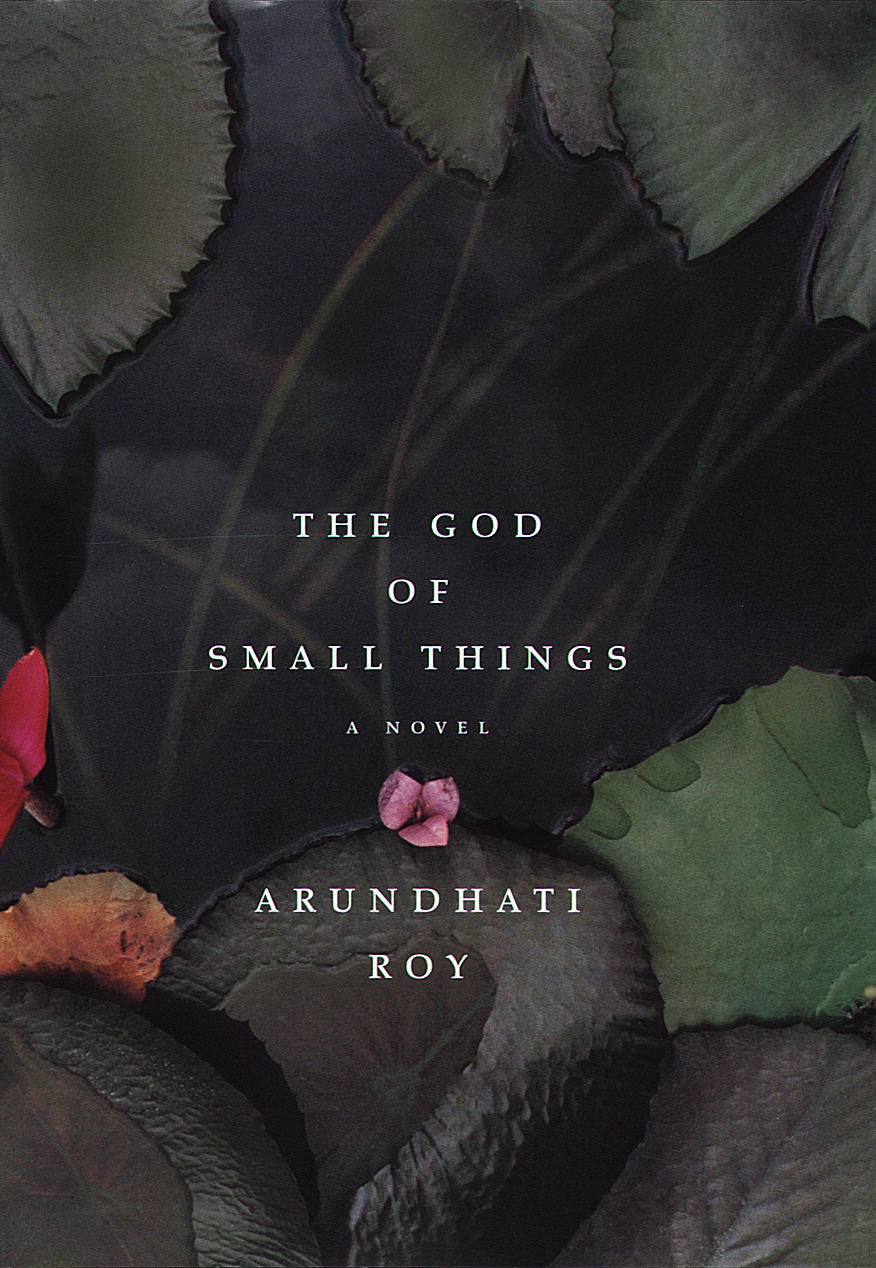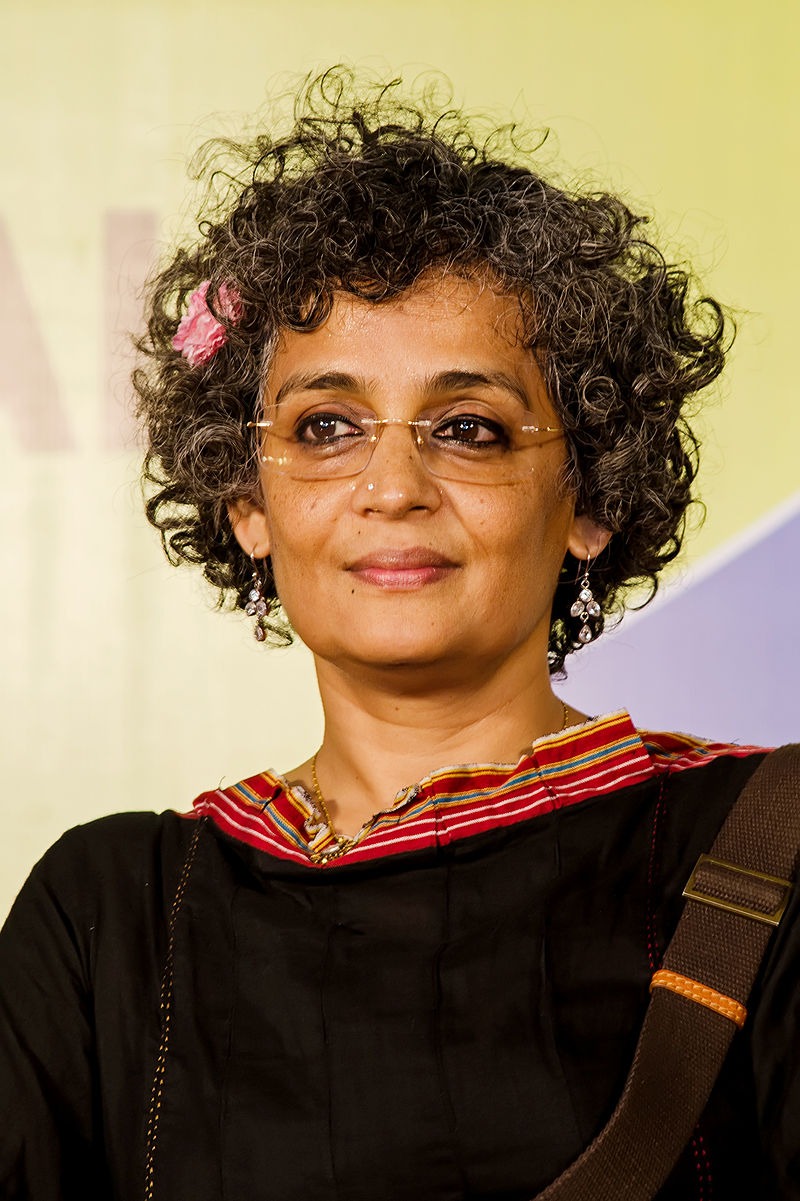Published May 2nd, 2022
Review
by Namita Suberi
The God of Small Things (1997) is Arundhati Roy’s debut novel and it won her the Booker Prize in 1997. Its story is a celebration of love and memory, in a world and society where the privileges of birth often trump everything else. The book caused an uproar in India when it was published, due to the inter-caste affair featured in the novel. It was one of the major things that landed Roy in court on charges of obscenity.
Once in a while, you find a book that makes your heart feel too heavy.
Arundhati Roy’s, The God of Small Things was one such book that beckoned to me from the ever-towering, non-reducing To-Be-Read pile on my bedside table. The book cover with green leaves and a pink lotus flower adds to the lulling sense of false ease that ever so slightly urges you to give the book a try. That was the beauty of the book, inside and out. It intricately carves, in dreamy brilliance, the ins and outs of being human in an unforgiving world bogged down by social conventions.

The novel opens with May in Ayemenem, a small village in Kerala, India. The imagery is so vivid that you can feel the humid air and see the black crows gorging on mangoes. The vines and creepers snaking up the poles are almost palpable, even tangible. We are then slowly introduced to various characters. Rahel is the first character we see who has returned from America to the big and empty Ipe house in the hope that she might meet her twin, Estha, there. Ammu, their mother, is dead.
The reader is then taken back in time in a world where Rahel and Estha are kids. Most of the story is told through the perspective of the twins who find joy in small things. These small things are not limited to just the children; for example, there is Pappachi’s moth and uncle Chacko’s model airplanes which will never fly. The characters in the book have these small things they hold on to, repeatedly, as though these might provide some meaning to their lives. The book itself uses short and small sentences to emphasize how tiresome the routine and lives of these characters are.
They knew that there was nowhere for them to go. They had nothing. No future. So they stuck to the small things.
Arundhati Roy weaves a complex tapestry of many themes: child sexual abuse, love, sexism, and discrimination towards certain group of people. The predominant theme that is brought to the foreground is that of the Caste system that is still practiced in India and among Hindus in other countries.
The novel illustrates with honesty the socio-economic conditions of the people of the town of Ayemenem as well as the discriminating and rigid traditions and social conventions. The prejudice and almost inhumane treatment of the Dalit community is shown through Velutha and his family. His family is a “Paravan,” therefore considered “untouchable.” Even after they change their religion to Christianity to escape the scourge of untouchability, they realize that nothing has changed.
Mammachi told Estha and Rahel that she could remember a time, in her girlhood, when Paravans were expected to crawl backwards with a broom, sweeping away their footprints so that Brahmins or Syrian Christains would not defile themselves by accidentally stepping into a Paravano footprint.
The novel repeatedly talks about the “Love Laws” which prescribe “who should be loved, and how and how much.” Inter-caste marriages are still forbidden in Hindu communities and sometimes can have disastrous consequences.
Ammu and Velutha trespass on these love laws and face the consequences. The depiction of misogyny is also apparent in the differential treatment of Chacko and Ammu. Mammachi builds a side door for Chacko who sweet-talks women working in the pickle factory to bed, but Ammu’s affair is taken as a slight on the family’s honour and she is locked up in her room. Velutha isn’t so lucky. The amalgamation of this boundary and committing something forbidden has devastating consequences that wreck the lives of not only Ammu and Velutha but also Rahel and Estha.
Memory is an important facet of the novel. The whole act of storytelling becomes an act of illustrating the very nuances of how human memory works. The plot sometimes rushes years into the future, other times it slows down to convey in unhurried detail certain events or incidents. Most of the time, the story is shown through the eyes of the twins who share some vivid details of things that they can’t seem to come to terms with, even in their adulthood.
Other characters in the novel have their own story of the past that shapes their present and future. The narrative shifts from character to character, allowing the readers an insight into their lives to help understand why they are the way they are.
We are given a glimpse of a young Ammu hiding from a violent father who beats her mother for any small inconvenience. Ammu marries to escape this household and to escape her domineering father. She ends up in a similar place like her mother where her husband drinks, beats her, and tries to pimp her to his boss. She returns to her home which is no longer hers. Her mistake of marrying badly, then a divorce renders her an outcast in the eyes of her family.
Occasionally, we slip into Chacko’s memories of his days as a young Rhodes scholar and his time at Oxford where he falls in love with Margaret and still longs for his daughter. We are even afforded a look at Baby Kochamma and her unrequited love for one Father Mulligan, which pushed her into choosing to live as a nun for a time. In all these bits and pieces from the past of the characters, the reader slips into the lives of each of these men and women to examine them as individuals and feel their sorrow, grief, and despair as their own.
Trauma is central to the characters in The God of Small Things. It seeps into their lives and drives their every decision.
Ammu’s traumatic childhood with an abusive and toxic father pushes her to make the necessary decision to escape the cycle and move far away in the hopes that she will flee her old life. She makes the mistake of marrying badly and returns home as an outcast with her children. Ammu seems unable to leave the cycle of her trauma as tragedy unfolds with her trespassing on the Love Laws.
Chacko longs for his daughter, Sophie Mol. The trauma of separation from his dear daughter never leaves him even after he returns to India and takes over the pickle factory. He is still stuck that fateful night when he would slip out of his bed to look at his sleeping child before leaving.
Estha and Rahel crave love and affection which they never receive from their maternal side of the family. Their strike an unlikely friendship with Velutha, further setting them apart from the rest of the characters. The tragedy in their lives never seems to end, exacerbated even more by their separation from each other after which Estha falls completely silent. Their make-believe world of small joys collides disastrously with the big things in life and this leads to catastrophe. There is an endless cycle of grief, trauma, and guilt (imagined or otherwise) that envelopes them like a second skin.
But worst of all, [Estha] carried inside him the memory of a young man with an old man's mouth. The memory of a swollen face and a smashed, upside-down smile. Of a spreading pool of clear liquid with a bare bulb reflected in it. Of a bloodshot eye that had opened, wandered, and then fixed its gaze on him. Estha. And what had Estha done? He looked into that beloved face and said: Yes.

This intimate, heart-wrenching novel becomes a play where every character writes their own doom trying to cope with things that they have done or were done onto them. The fragmented narrative that Roy uses, often jumping from one timeline to the next, from one event to another, creates this masterpiece of literature with broken people trying to gather themselves at the edges. Her use of non-linear narrative reinforces the complexity of existing and surviving as a human in the world of other humans with rigid social conventions and norms fearing the consequences of failing to abide by them.
While reading this book I found myself wondering whether some of the things we do in the name of culture and tradition are really humane. I was born into a Hindu family. As someone who is a part of the Hindu religion or culture, one is bound to receive a ‘lecture’—almost as a warning of being involved with someone lower in the caste hierarchy and the consequences of trespassing this seemingly invisible boundary. Reading the book was like walking a tightrope between guilt and revelation: Guilt for being complicit in this outrageously discriminatory long tradition of casteism in one way or another; and revelation of how humane we all our in the strength of our desires. I was left speechless and sorrowful in the wake of this book with a lingering feeling of helplessness towards the mess we as people have made of our own community for a fleeting bid for power. And yet, like Rahel and Estha, who persevere on with their trauma in the novel, there must still be hope somewhere.
The God of Small Things, therefore, becomes a story of a multitude of things and anybody who tries to squeeze it into one definition will miserably fail to do so. It is a complex novel about human beings doing human things and suffering devastating consequences. Chacko, in the novel, aptly states:
Anything’s possible in Human Nature. Love. Madness. Hope. Infinite joy.
Nationality: Bhutanese
First Language(s): Nepali
Second Language(s):
Dzongkha,
English
Supported by:

